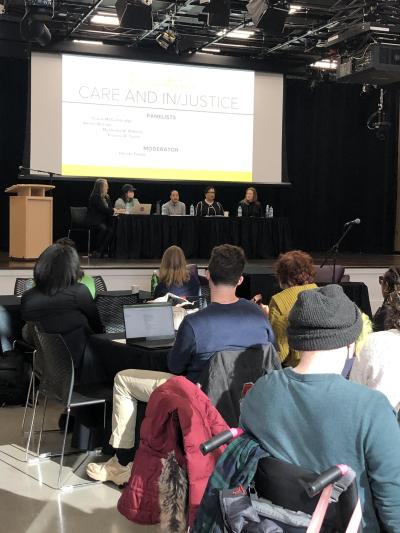Care | Culture | Justice Symposium
On December 6, 2024, over 80 faculty, students and community members from city government and public schools participated in the Society of Fellows symposium: Care | Culture | Justice.
The Society of Fellows is a signature program of the Global Arts + Humanities Discovery Theme. Each year, the Society of Fellows focuses on a theme. The 2024-25 theme foregrounds care as an interdisciplinary investigation. Commonplace (Western) definitions of care tend to emphasize transactional processes of providing for the needs of someone or something. But, as contributors to the symposium demonstrated, care is a relational practice shaped by power differentials across care-giving relations, structures and economies.

The symposium kicked off with a performative meditation on Black Girlhood featuring five high school students — Imani Akita, Vanessa Brobbey, Mariah Chaffin, Ellie Sheja and Biana Smith -E-Incas — and Stephanie Power-Carpenter, a Professor in Teaching and Learning and SOF Leadership faculty fellow.
As contributors to the first roundtable, "Care and In/Justice," pointed out, presumptions of care and judgements about who is or is not deserving of care are far too often deployed in ways that further divide us. Panelists included Akemi Nishida (a disability justice advocate and professor from University of Illinois), Priscilla R. Tyson (former City of Columbus Council member), Tracie McCambridge (Director of Art and Resilience at the Wexner Center for the Arts), Mysheika W. Roberts (Columbus City Public Health Commissioner) and Christa Teston (Ohio State Professor of English and SOF Leadership faculty fellow) as moderator. The panelists reminded us that when care for some is contingent upon the exclusion of others, care seeds division. Care for one community should not entail the disenfranchisement of another.
Roundtable One was followed by a powerful keynote address, “Equity by Design: Crafting Just Care Beyond Race and State,” by Harriet A. Washington. Washington is an award-winning medical writer, educator and ethicist, whose book Medical Apartheid: The Dark History of Experimentation from Colonial Times to the Present, won a National Book Critics Circle Award. Ange-Marie Hancock, Executive Director of the Kirwin Institute for the Study of Race and Ethnicity, introduced the keynote address. Washington pointed to the legacy of the violent histories and scientific bias that continue to shape structures of care in the United States and asked us to think about care as an ethical obligation.
Roundtable two, "Care As/Is Policy," further engaged the paradoxes of care and turned our attention to the conditions that shape differential risk and harm and need to recalibrate public policy responses to these conditions. Panelists included Anne Trinh (Director of Strategic Initiatives, Ohio State Center for Health Outcomes and Policy Evaluation Studies), Shameka Poetry Thomas (Instructor, Ohio State Center for Bioethics), Tasleem Padamsee (Associate Professor, Ohio State College of Public Health) and Kedar Hiremath (Associate Director, Ohio State Chronic Brain Injury Program) as moderator.
Throughout the day, panelists urged us to contemplate how we might cultivate more caring relations across differences and within ourselves. How we might build agile infrastructures to resource wider forms of care. They prompted us to newly imagine the commitments necessary to deliver more equitable structures of care and caring relations. They encouraged us to embrace care grounded in reciprocity and mutuality. They asked us to change how we engage each other and the world, and to take up the charge and commitment to more caring futures.
